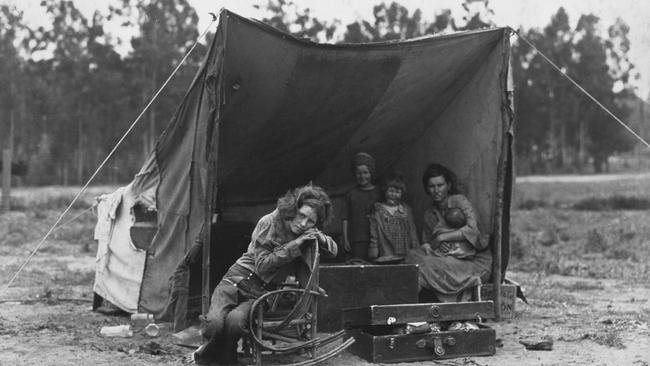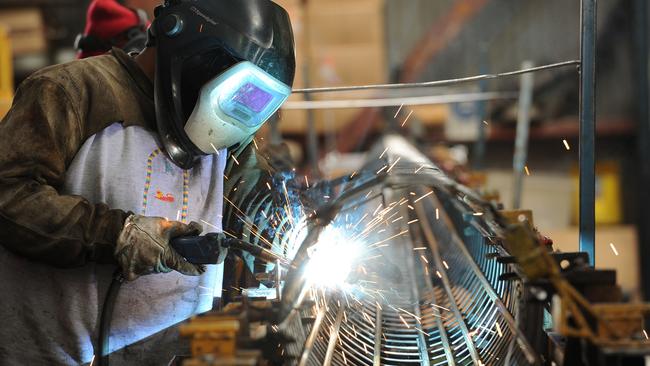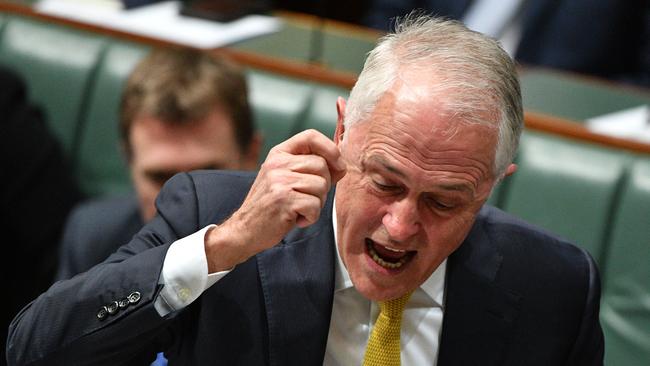How to prepare for ‘economic armageddon’
“THERE is still a small window of time”. These are the 10 simple steps every Australian can take right right now to prepare themselves for a possible economic crisis.
OVER the past two years, Australian economist John Adams and others have been warning of a looming global crash, based on record levels of public and private debt, ultra-low interest rates, excessive public spending and a massive housing bubble, among other indicators.
This week, the former Coalition adviser outlined six possible scenarios for the future, depending on whether central banks continued to artificially prop up economies with “quantitative easing” money printing policies, or ended the post-GFC stimulus measures and began to raise interest rates.
While Mr Adams — whose concerns are being quietly acknowledged by a growing number of politicians — believes it’s now too late for government action, he argues there are a number of things ordinary Australians can do to prepare themselves.
He has outlined 10 steps that will “hopefully serve as a useful action guide for individual Australians to get their affairs in order and prepare for the coming crisis”.
“The coming economic armageddon is fast approaching and many Australians are completely unprepared for the possible economic consequences that will result from the crisis,” he said. “There is still a small window of time for individuals to take steps to prepare for the economic crisis not only on a financial basis, but also on a holistic basis as well.”

Mr Adams said in the event of a crisis, financial stress brought on by excessive debts coupled with loss of income and unemployment would “wreak social havoc across the country”, with mental health issues such as stress, anxiety and depression, drug abuse, alcoholism, domestic violence, relationship breakdown and depression likely to increase.
“According to a 2014 study published in the British Journal of Psychiatry, there was a marked increase, during and immediately after the Global Financial Crisis, in the rate of suicides especially in Europe and North America,” he said.
“This study conservatively concluded that over 10,000 suicides between 2008 and 2010 could be directly traced back to the effects of the financial crisis, with those most at risk suffering from clinical depression.
“Moreover, other studies suggest that the effects of the GFC led to an increase in the consumption of antidepressants as well as to incidents of domestic violence.”
It comes as the Reserve Bank warns that an estimated 200,000 interest-only home loans will roll over to principal-and-interest in the next three years, bumping up repayments by around $7000 a year for the average borrower.
“Assistant RBA governor Michelle Bullock revealed in February that based on 2017 data, approximately 27 per cent of Australians with an owner-occupier mortgage have paid less than one month in advance on compulsory minimum repayments,” Mr Adams said.
“Also, RBA data indicates that as of November 2017, approximately 80 per cent of mortgages [are] variable interest, making them susceptible to sudden shocks to international financial markets, especially where international interest rates shoot up unexpectedly.
“These cohorts of Australians therefore are potentially most at risk. Individual Australians must ultimately assume responsibility for themselves and their economic circumstances. They must not rely on the government to rescue them.”
Ten Steps to Prepare for the Coming Economic Armageddon
by John Adams

Step 1: Read history
The adage ‘hope for the best but prepare for the worst’ is perhaps the best advice to handle the coming economic armageddon. Given that the last economic recession in Australia was 27 years ago and that Australians under the age of 44 have never experienced adverse economic conditions as a working adult, most Australians have no conception of how bad economic conditions may become in the coming economic crisis.
Reading about what occurred in previous economic crises such as the US depression of 1921, the Great Depression of 1929 or episodes of runaway or hyperinflation such as in Weimar Republic Germany are likely to be your best guide to understand how the coming crisis may unfold, how unprepared people suffered as well as how best to prepare, survive, identify opportunities and take advantage of those opportunities.

Step 2: Focus on your personal cash flow
One of the key determining factors of who will be best placed to handle the coming Economic Armageddon will be those who are best at managing their cashflow in order to meet their financial obligations when they come due.
Individuals can take steps today to improve their cashflow, put money aside to manage potential future cashflow problems and to mitigate the risk of significant changes to cash flow such as from a spike in interest rates, higher household expenses or an unexpected loss of income.
One of the best ways for Australians to improve their personal cash flow is to simplify their lifestyles. This could include: cutting back on unnecessary spending, making your home self-sustainable through renewable energy or water tanks, or finding cheaper substitutes to current activities, for example, exercising in the local park as opposed to going to a gym.

Step 3: Reduce debts
Australia today is experiencing the largest household debt bubble in our nation’s history. Many Australians have financially overextended themselves by committing themselves to too much personal debt and unsustainable lifestyles.
The ability to service those debts when for example, interest-only periods expire or in a higher interest rate environment will be difficult for many Australians to the point where some Australians will be forced into bankruptcy.
By embracing a simpler lifestyle, improving personal cash flow and selling unneeded assets and possessions, any increase in personal savings can be used to repay current debts.
Debts which incur higher interest rates and shorter duration periods should be tackled first before other forms of debt.

Step 4: Hold good money
No matter how much savings an individual has, all Australians need to ensure that the money they possess is able to retain its purchasing power so that the money can be exchanged for an equal amount of goods and services regardless of economic conditions.
In the coming economic crisis, if the Federal Government and the RBA seek to further inflate the supply of Australian dollars (i.e. money and credit) through, for example, pumping additional liquidity into the financial system, lower interest rates and quantitative easing, the result may be a loss of purchasing power of the Australian dollar and even runaway inflation.
Individuals should consider what forms of money are likely to retain their purchasing power across various economic scenarios and seek to obtain those forms of money whether they be official government currency, crypto currencies or traditional forms of money including precious metals such as gold, silver or platinum.

Step 5: Diversify your incomes sources and professional skill set
During the upcoming economic crisis, unemployment is likely to go up as businesses struggle in a slowing economy. For Australians to place themselves in the best position to handle tougher economic conditions, individuals should now be seeking to establish diverse sources of income that allow them to mitigate the consequences of losing their job.
This can be achieved by obtaining a part time job or by starting an after-hours microbusiness that involves creating and providing a good or service.
Moreover, individuals should invest into diversifying their professional skill set that provides them with greater flexibility in the labour market and allows them to be more competitive.

Step 6: Develop and improve your home skills
During time of economic adversity, those best to handle such conditions tend to be those who are self-reliant. Individuals can dedicate themselves to becoming more self-reliant now by developing and improving their home skills which can allow individuals to accomplish more with less money.
This can include learning to service your own car, make basic repairs to your own home, making or mending your own clothes (including sewing or knitting), growing and preserving your own food, raising your own animals, brewing your own alcohol, and inventing your own forms of entertainment including games for children.

Step 7: Strengthen your personal relationships
During times of economic adversity, unemployment and financial stress can lead to significant personal and social issues among family and friends. Those people who will be best positioned to endure tough economic times will possess a supportive network of family and friends who will be able to support each other through economic struggles.
To ensure that Australians can be a source of comfort for others and that they have sufficient personal support, individuals should seek to strengthen existing bonds with family members and friends, make new friends by being active in your local community either through established community groups or clubs or by volunteering in local community activities or events.

Step 8: Eat healthy, become physically fit and sleep well
Recent discoveries in medical science have demonstrated that eating healthy, being physically fit and getting adequate high-quality sleep are one of the main defences against various forms of stress whether they be of a financial, mental or an emotional nature.
Australians who are willing to commit to a plant-based, high-protein, low-sugar, low-manufactured fat diet, coupled with regular and rigorous exercise and sufficient sleep prior to the crisis will ensure that their mind and body have sufficient nutrients to operate effectively and be best prepared to avoid potential mental health issues such as anxiety and depression.

Step 9: Embrace spirituality
In times of personal crisis and vulnerability, humans instinctively seek out sources which are able to provide hope, wisdom and comfort allowing them to cope as well as become more inspired and resilient.
Embracing spirituality, whether by means of a formal organised religion such as Christianity or other belief systems prior to the economic crisis can provide individuals with their own sense of meaning and purpose and can inspire them to personal excellence as well as to obtain profound insights and guidance that can assist in managing adversity.
Individuals who join groups that embrace similar belief systems can also provide individuals with a sense of belonging, community and security under a unified purpose that builds social capital and community resilience.

Step 10: Become politically engaged and advocate for good public policy
To ensure that individuals and the broader community are shielded from the worst of the crisis, it is critical that citizens play an active role in the political process by understanding what is occurring both politically and economically and advocating for good public policy before the onset of, as well as during the crisis.
Individual Australians don’t necessarily have to join a political party to become politically engaged, rather they can write to members of parliament, form new groups of like-minded individuals either within your community or online through social media, formulate your views and either publish them in written form or communicate directly to the public by starting your own online channel.




